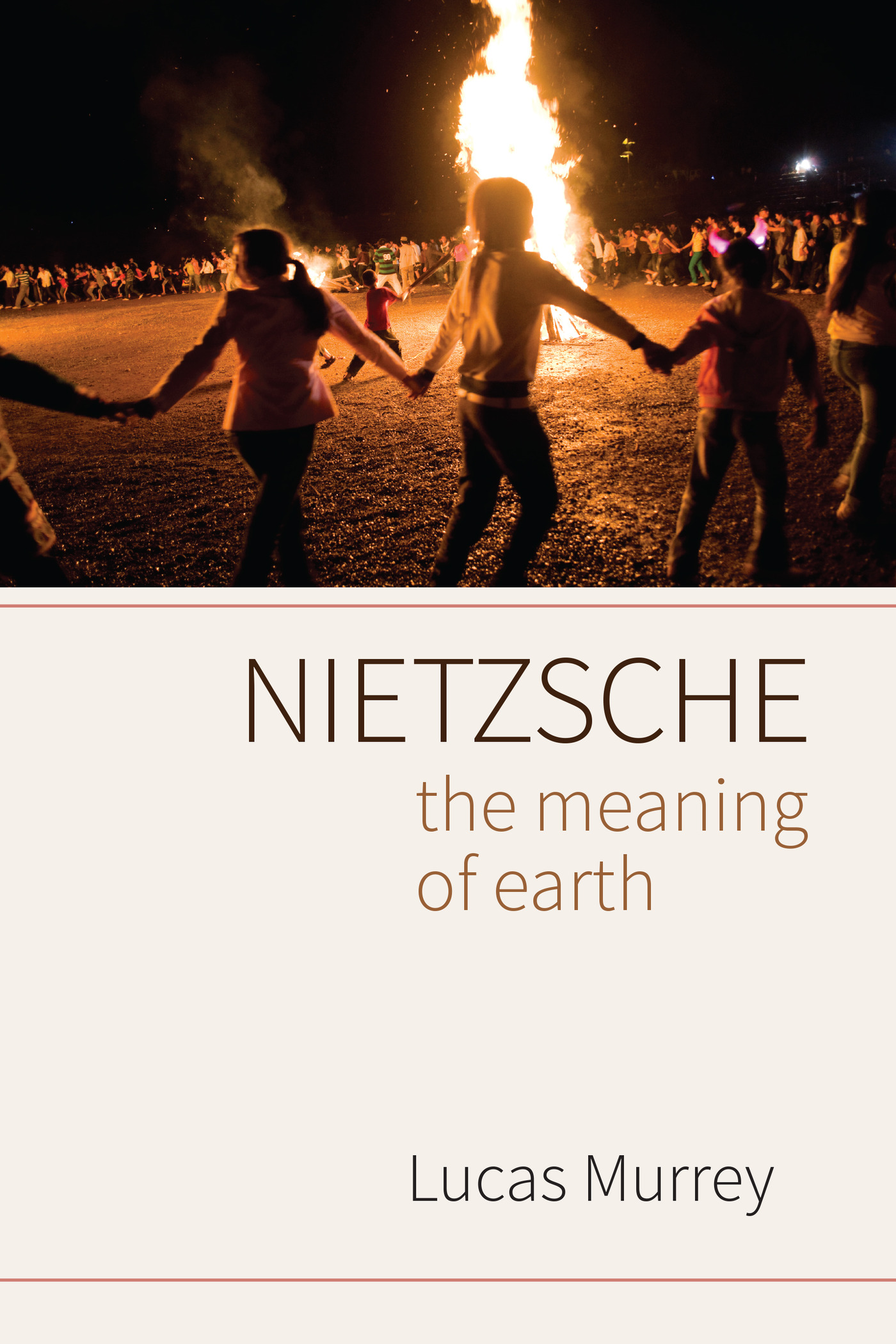Nietzsche
Nietzsche
The Meaning of Earth
Lucas Murrey
LEHIGH UNIVERSITY PRESS
Bethlehem
Published by Lehigh University Press
Copublished by The Rowman & Littlefield Publishing Group, Inc.
4501 Forbes Boulevard, Suite 200, Lanham, Maryland 20706
www.rowman.com
Unit A, Whitacre Mews, 26-34 Stannary Street, London SE11 4AB
Copyright 2015 by Stewart Lucas Murrey
All rights reserved. No part of this book may be reproduced in any form or by any electronic or mechanical means, including information storage and retrieval systems, without written permission from the publisher, except by a reviewer who may quote passages in a review.
British Library Cataloguing in Publication Information Available
Library of Congress Cataloging-in-Publication Data
Murrey, Lucas.
Nietzsche : the meaning of earth / Lucas Murrey.
pages cm
Includes bibliographical references and index.
ISBN 978-1-61146-154-1 (cloth : alk. paper) -- ISBN 978-1-61146-155-8 (electronic)
1. Nietzsche, Friedrich Wilhelm, 1844-1900. 2. Dionysus (Greek deity) 3. Philosophy of nature. I. Title.
B3317.M89 2015
193--dc23
2014047068
 TM The paper used in this publication meets the minimum requirements of American National Standard for Information Sciences Permanence of Paper for Printed Library Materials, ANSI/NISO Z39.48-1992.
TM The paper used in this publication meets the minimum requirements of American National Standard for Information Sciences Permanence of Paper for Printed Library Materials, ANSI/NISO Z39.48-1992.
Printed in the United States of America
To Noam Chomsky and Charles Ferguson,
in the hope of deepening our understanding of the psychic origin of greed.
And to Barbara Bodine, Srgio Vieira de Mello, and the Iraqi people,
heroines and heroes,
der Sinn der Erde.
Acknowledgments
I would like to thank Getty Images for the permission to use the cover picture. I am also especially thankful to my mother, father, sister, and grandmotheras well as my colleagues and friendswho supported this work.
Preface
In his unpublished preface to Animal Farm, George Orwell points out that unpopular ideas can be silenced, and inconvenient facts kept dark, without the need for any official ban.
This description of the visual and linguistic culture to which we as a species remain captive invites us to consider a few questions. How are we to understand the powerful psychic force that has been harnessed to destroy language and the freedom to see? And in what way does money underlie this unlimited, dirty river of words and pictures that, in turn, instills the social conformity of slavery to individual tyrants?
In no small measure, these are the questions that the following study of Friedrich Nietzsche seeks to answer. As I show, Nietzsche understands individuals in modern time as imprisoned in a distracting, narcissistic image that is violently cut off from nature and community. And with fifty mirrors around you, Zarathustra says, horror-struck, you flatter and slander your play of colours! Further, Nietzsche explicitly connects such visual ghastliness with the no less shocking monetization of humankind, as preeminently exemplified by the modern city, which steams with the vapour of slaughtered spirit and which is ruled by isolated tyrants who jingle with their gold.
This is not to say that such answers are always straightforward. For what does it mean to say that wealthy men and women, who, by virtue of their unleashing of the unlimited images in which our everyday lives drown, rule our hyper-visual civilization while they jingle with their gold? On the one hand, it is clear that this endless flow of pictures is caught up also in an endless flow of language that knows nothing of the communal spirit of earth. About this Nietzsche leaves little doubt, as when he casts light on the linguistic essence of the city wherein spirit has here become a verbal game.... Loathsome verbal-swill does it vomit! In fact, it is this verbal game from which the centralized press and its daily newspapers issue forth: they make newspapers out of this verbal-swill. Do you not see the souls hanging like limp, dirty rags?And they even make newspapers out of these rags!
But, on the other hand, can we say that Nietzsche identifies the source of the exceptional psychical presence that the moguls of the media willfully appropriate to kill the natural rights of people to see and speak? Although he creatively evokes the Apolline in regard to a primal desire for appearance, that is, a limitless desire to stabilize a single world-image, Nietzsches Dionysian insights are alas neutralized by nineteenth-century strains of nationalism and racism.
In a way, this brings me to the goal of this study, which is to transcend Nietzsche and wonder about our own answers to the questions above. How, for instance, do we understand the origin of the mass psychosis to which our language and style of seeing has succumbed? And in what way has the unlimited essence of the (relatively) new visual media of money been able to indoctrinate, through its control of the media, a general tacit agreement that it wouldnt do to mention that particular fact? If the following does not directly answer these urgent questions, one thing remains clear: Examining Nietzsches search for such answers will surely enrich our own.
L. Murrey
December 7, 2014
Corseaux, Switzerland
Notes
George Orwell, The Freedom of the Press, Times Literary Supplement, 15 September 1972.
Ibid.
Ibid.
Abbreviations
AThe Antichrist
ASC Attempt at Self-Criticism (1886 Preface to BT)
BGE Beyond Good and Evil
BTThe Birth of Tragedy
CW The Case of Wagner
DDaybreak
EH Ecce Homo
GM On the Genealogy of Morals
GS The Gay Science
HAH Human, All Too Human
KB Kommentar zu den Bnden 113
NCW Nietzsche contra Wagner
NF1Nachgelassene Fragmente 18691874
NF2 Nachgelassene Fragmente 18751879
NF3 Nachgelassene Fragmente 18801882
TITwilight of the Idols
TL On Truth and Lies in an Extra-moral Sense
UM Untimely Meditations
Z Thus Spoke Zarathustra
Introduction
Rise of Mass Culture and the Visualized Chronotope
This work on Friedrich Nietzsche (18441900) follows that which I recently devoted to Hlderlins Dionysiac Poetry.
But what makes this earthly form of picturing the cosmos critical is how, in its modern instance, the psychic danger of capitalism in industrial time is brought to light. earths resources to satisfy their images of individualism.
But as this work also shows, Hlderlins resurrection of Dionysian seeing leans into oblivion. Lack of a mentorone thinks of Friedrich Schiller, who stood by his dearest Swabian as Hlderlin lived on next to nothing and ate only one meal a day gives way to isolation. By 1800, Hlderlin loses contact with Georg Hegel and Christian Neuffer. Although enduring, his relationship with Isaac von Sinclair (who also falls in love with Hlderlins lifelong muse, Susette Gontard, and who is later accused of treason in Wrttemberg) represents an ambivalent, tense, and episodic friendship, at best.
In the abyss of Hlderlins desolate time (v 122)
To understand the (industrial) modern light that consumes Hlderlins Dionysian illumination we must consider, on the one hand, the progress of technology in the eighteenth century. Although the poet is inseparable from idyllic southwest German (and French) landscapes, already during his earliest songs humankind is unlocking a new form of energy capture. Suddenly Western civilization has access to what seems like an unlimited amount of steam and electric power. Throughout the remainder of Hlderlins life, the speed of technological progress not only continues, but increases its velocity. Humphrey Daviss hideous mass of Voltaic piles (and sulfurous fumes) in 1808 is followed by Hans rsteds (accidental) discovery of electromagnetism in 1820 and Michael Faradays transformation of this (magical) phenomenon into movement one year later in 1821. In a little over two decades after Hlderlins death on June 7, 1843, James Maxwell formulates the first theory of wireless communication in his
Next page
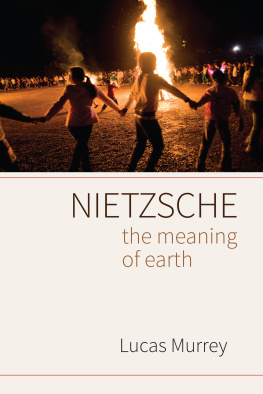
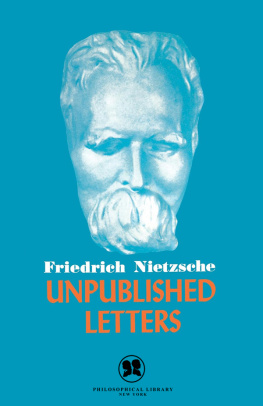
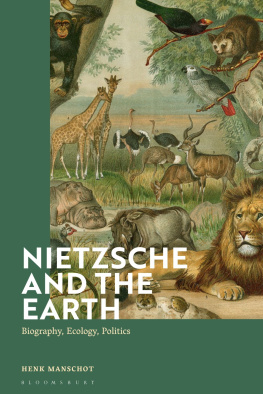


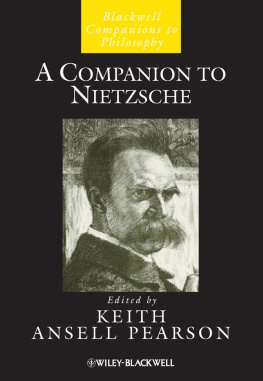


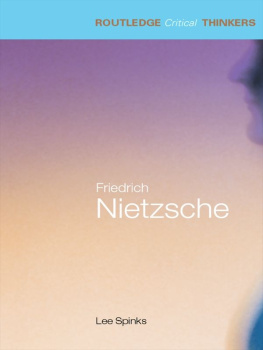
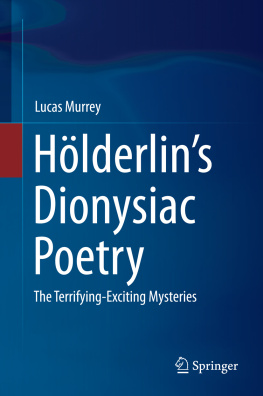



 TM The paper used in this publication meets the minimum requirements of American National Standard for Information Sciences Permanence of Paper for Printed Library Materials, ANSI/NISO Z39.48-1992.
TM The paper used in this publication meets the minimum requirements of American National Standard for Information Sciences Permanence of Paper for Printed Library Materials, ANSI/NISO Z39.48-1992.